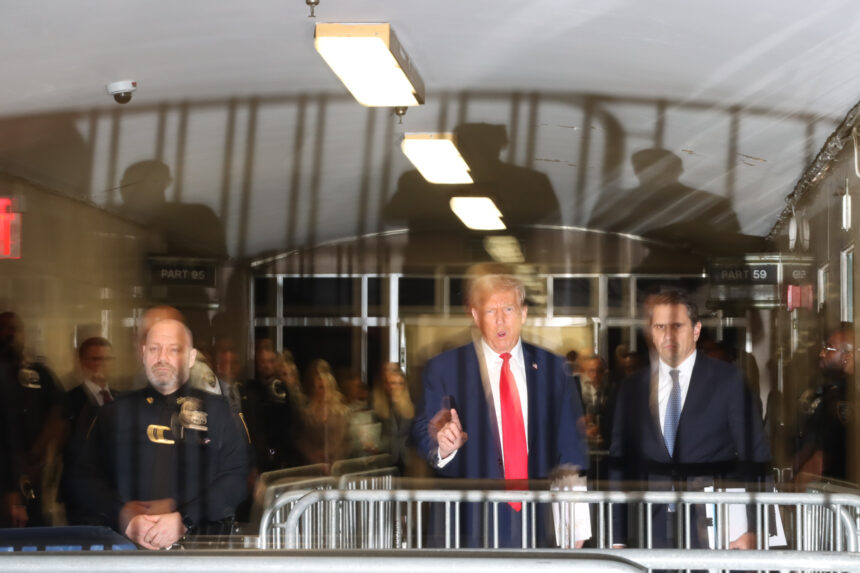NEW YORK — Manhattan prosecutors teed up a key witness in Trump’s criminal trial on Tuesday to delve into the hush-money allegations that form the center of their case: concealed, and allegedly covered-up, payments to adult film star Stormy Daniels.
Testimony about Daniels, from former National Enquirer publisher David Pecker, will help build the core of prosecutors’ narrative: Trump scrambled to buy Daniels’ silence in the final weeks of the 2016 election, and, they contend, subsequently arranged a complicated scheme to falsify business records to reimburse Michael Cohen for the payments to Daniels.
Pecker’s testimony, which began after opening statements on Monday, will be key to describing the scheme.
But on Tuesday, prosecutors led Pecker along a path which will eventually — but has not yet — lead to Daniels. Testimony stopped just before they reached the story of how Trump allegedly conspired to pay Daniels off in a bid to keep her story from going public.
The day began, after a 90 minute contempt hearing, with Pecker describing his relationship with Trump while the former President sat feet away.
The pair’s relationship was extremely transactional or, as Pecker put it, “mutually beneficial.” And, it’s unclear if, even today, it’s entirely ended: Pecker seemed intent on ingratiating himself with Trump throughout, describing him at one point as the “most eligible bachelor” and recalling how he once pitched Trump on “creating a magazine called ‘Trump Style.’”
“He liked it a lot,” Pecker recalled of that proposal.
It all painted a picture of a relationship in which Pecker would use the tabloids under his control to help Trump build and burnish his image as a successful businessman and playboy. Trump, in turn, would feed Pecker tips to keep selling the supermarket magazines on which AMI — the business of which Pecker was CEO — thrived.
In one 2000s episode that foreshadowed events to come, the National Enquirer conducted a poll: How many readers would support a Trump presidential run? “80 percent,” Pecker recalled.
The pair’s symbiotic relationship intensified, Pecker said, after Trump announced his Presidential run in 2015.
That summer, in August, Trump and Michael Cohen invited Pecker to a meeting, he recalled: there, Pecker agreed to help protect Trump, his image, and by extension his candidacy by serving as “eyes and ears.” He would identify negative stories and alert Michael Cohen, while using National Enquirer to publish positive stories about Trump and negative articles about his enemies.
Prosecutor Joshua Steinglass presented images of some of those stories to jurors. They included such headlines as:
WORLD EXCLUSIVE: THE DONALD TRUMP THAT NOBODY KNOWS!
DONALD TRUMP: ‘HEALTHIEST INDIVIDUAL EVER ELECTED’
BUNGLING SURGEON BEN CARSON LEFT SPONGE IN PATIENT’S BRAIN!
TED CRUZ SHAMED BY PORN STAR
The agreement was successful enough that, Pecker said, Steve Bannon suggested at one point that National Enquirer should have a reporter go on Fox News host Sean Hannity’s show to discuss a series of articles about Hillary Clinton.
But it’s the other half of the arrangement — in which Pecker sought out negative stories to catch and kill — which was the focus of much of Pecker’s testimony Tuesday, and put prosecutors on their course toward Daniels.
After Trump announced his candidacy, Pecker said, two people came to his attention via his “eyes and ears” role. One was a former Trump doorman, Dino Sajudin.
Sajudin was hawking a fabricated story to the effect that Trump had fathered a child out of wedlock with a maid in his employ. Prosecutors had Pecker walk the jury in detail through a “source agreement”: Sajudin purportedly received $30,000 in exchange for his silence in “perpetuity.”
The testimony helped prosecutors establish how this all worked. Cohen told Pecker that “the boss” would approve of what they were doing.
Pecker suggested at one point that vetting the story, determining it was untrue, not publishing it, and paying for it to remain under wraps was a real missed opportunity for the publication. “It would be the biggest story for the National Enquirer since the death of Elvis Presley,” he remarked. Nonetheless, Pecker maintained his arrangement with Trump and did not publish.
After Sajudin, prosecutors moved on to Karen McDougal, a former Playboy playmate who claimed to have had a year-long affair with Trump. Trump continues to deny the claim, though Pecker told the court that his reporters’ investigation led him to believe there was some truth to it: “This one is a little different,” he recalled telling Cohen.
Pecker’s team gave McDougal’s story the same treatment that they gave to the false Sajudin allegation: buy it, and silence it. McDougal, according to Pecker, claimed there was some interest in her story from other seemingly unlikely venues, including Dancing With The Stars and an unnamed Mexican group supposedly offering $8 million.
Pecker told Trump that he didn’t believe the competitors were real, but advised Trump to go through with the hush-money agreement.
“Any time that you ever do anything like this, it always gets out,” Pecker recalled Trump remarking.
Testimony stopped for the day as Pecker began to go into the details of the McDougal agreement.
We know from years of reporting and Michael Cohen’s own legal woes where this is headed: a third hush-money agreement, this one to suppress Stormy Daniels’ story, which is at the central of the DA Alvin Bragg’s indictment.
The prosecution arranged the three hush-money stories methodically, placing them in order of increasing significance and veracity. They started with the doorman’s dubious story, and then moved on to McDougal.
It sets up the court to examine Stormy Daniels’s hush-money scheme once it reconvenes on Thursday.
Source link

